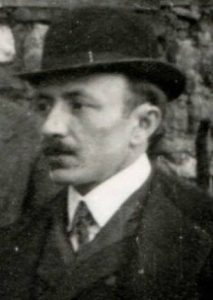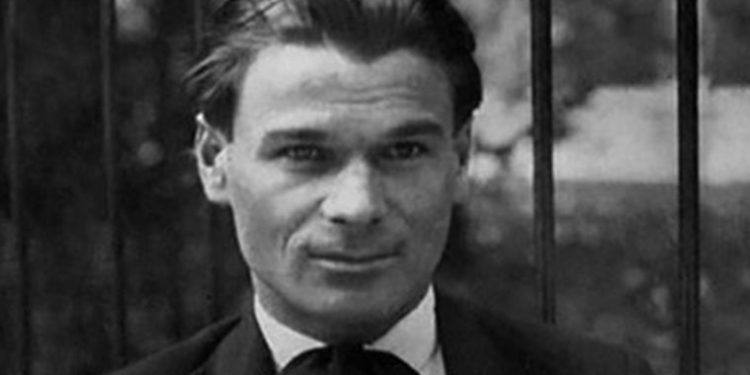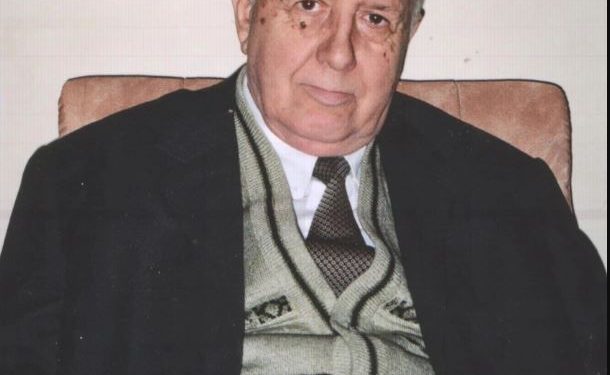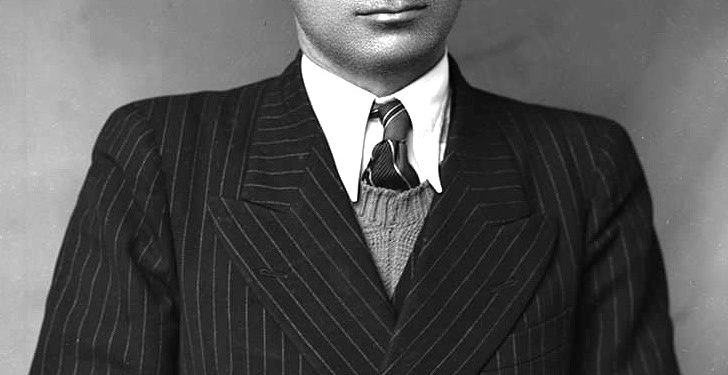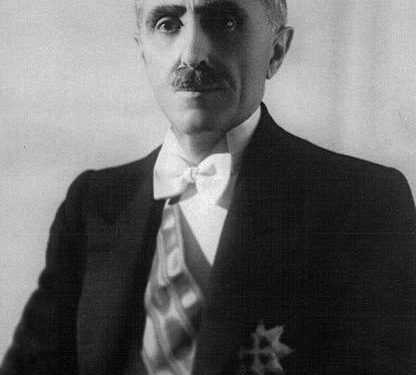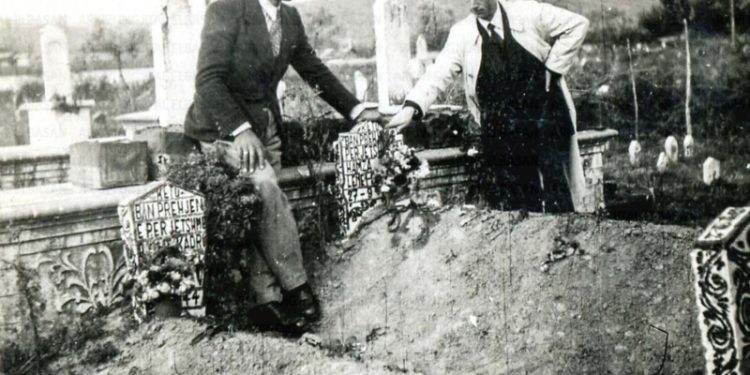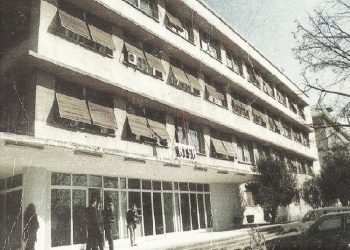By Robert Cipo
Memorie.al / Filip Papajani were from Elbasan, from the ‘Kala’ neighborhood. He was born in 1878. Since childhood, he had shown tendencies of independence and mistrust in everything. He did not believe in religion and mocked the “men of God”, priests and monks, although as life showed him, over the years, he became close friends with them. When he was little, he was sent to take mass to the church, along with a penny, to pay the priest for the religious service. At that time, the daily meal in the family was boiled beans with a little salt and corn bread, and only on the occasion of Easter, or other celebrations, such as the name day, did you cook another dish. Philip, with the penny he bought white cheese and with the wheat bread, with which the mass was cooked, sat and ate bread and cheese, behind the wall of the church. Someone saw him there and informed the family. The result of this whole event was a good beating and from that day on, he was no longer sent to take mass to the church.
It is not known what high school he managed to finish, but the fact is that he went to Romania, with in his pocket the address of an uncle of his who had emigrated many years ago, and the news coming to Elbasan showed that he had managed to he became very rich. He found his uncle safe and sound, but as for the wealth, he had only seen it in a dream.
There were dishwashers left, in the best restaurants of Bucharest. Upon arrival, Filipi enrolled at the University, in the Faculty of Medicine, but in order to pay for his studies and living, he also worked, with the recommendation of his uncle, as a dishwasher in restaurants, in the second and third shifts.
In Romania he found an environment where the fiery patriotic spirit was boiling and where all the Albanians of the colony of Bucharest worked and tried for Albania. In the patriotic Colony of Bucharest, he participated in the Movement for an independent Albania, which was led by Prince Albert Gjika, Romanian, of distant Albanian origin, a well-known personality in the Romanian political and literary circles of that period. To quell curiosity, we will say that he was the brother of the well-known writer, Elena Gjika, who in literature is known by the nickname “Dora d’Istria”.
He also agreed that Prince Gjika would wear the wedding crown in the Cathedral Church of Bucharest, an event which, due to the personality of Prince Gjika, was reflected in the front pages of the press of the time, causing the Albanian issue, took on a special public character, arousing special interest and discussions in the press, precisely in a period when Albania was still under the Turkish yoke and very little (to say nothing) was known to the Romanian people about its existence and the problems that preoccupied it in the outside world.
Filipi was also part of the group of Albanians from the Colony of Bucharest, who on April 23, 1905, organized a Congress in Bucharest, in the hall of the National Theater of the city, where representatives from Albanian colonies from around the world participated as guests as well as from Albania and Macedonia, or even political, public, and literary personalities from all over Romania.
The Congress came up with the request proposed by Prince Gjika himself, for an independent Albania. The Congress elected a central committee, decided to publish a newspaper called “Kombi”. He also made the decision to prepare the armed uprising. For this, he appointed a governing body, in which Filip Papajani was also a member. He himself collaborated in the Albanian-language newspapers that were published there. He became a close friend of Asdren and when the latter from the 30s came for a visit to Albania, he stayed for a few days as Doctor Filip’s host in Pogradec.
In Bucharest, Filipi met the family of an immigrant from Korça, who had finally settled in Romania and had taken the whole family with him, changing the surname to Kostandinescu. He got engaged to his daughter and they got married, as we mentioned above, in Bucharest in 1909. There, in 1910, the first daughter, Margarita, was born. As an ardent patriot and nationalist, immediately after the declaration of Albania’s independence, in 1912, he left his wife and children and came to the Motherland together with Asdren, with a delegation led by Pandeli Evangjeli, to support the establishment of Prince Vid as King of Albania.
He himself had a troubled life. He came to Korça two more times, with a group of volunteers to fight against the Greek Andarts, who had occupied Korça and killed the priest Ballamaçi. He joined the gang of Mihal Gramenos, leading to the creation of a healthy family friendship, which friendship, their wives, Niqi e Gramenos and Angjeligia e Filipi, continued until the end of their lives. I also remember Mihal Grameno’s Niq, when he came to visit us, until around 1950.
He also fought against the gangs of Esat Pasha and Haxhi Qamili, considering the movement of the latter as anachronistic and a return to the Turkish occupation. In 1919, he called his family home and together they settled in Elbasan, where he started working as a doctor, leaving a very good impression on the people, and serving them with dedication, especially when the cholera epidemic spread in Elbasan and the Spanish flu.
He continued to write and in 1921, he founded the newspaper “Shkumbini” at his own expense, where he published some very strong critical articles against the regime that was being established in Albania. He continued this patriotic-democratic activity until 1924. Since the climate of Elbasan was unsuitable for the family that was used to the dry and cold climate of Bucharest, he settled in Pogradec, and being a romantic by nature, he built a house, m u on the shore of Lake Ohrid, but so close that in winter, when the north wind blew, the waves of the lake crashed against the walls of the house.
On the other hand, some want to say that one of the reasons for Doctor Lip’s departure from Elbasan was the intrigue concocted by the local feudal lords (especially Verlaci), as if Philip, in his medical visits, which he made to families, had visited and fell in love with what was considered at that time as the most beautiful woman in Elbasan. While in reality, people close to the family, explain in this way, the reason for his departure from Elbasan. During the time when he practiced the profession of a doctor, during the period of cholera and the Spanish flu, he had acquired a quantity of gold napoleons, which he left to be kept by his uncle’s daughter-in-law, in whose house he was staying.
And now sure that when he returned he would build his own house, he left to take his family to Bucharest. From the departure to Romania, the preparation of the family and the return to Albania, almost six months passed. Upon arriving in Elbasan, he asks his uncle’s daughter-in-law to return the Napoleons to build the house, and to his surprise, she tells him that the money was spent to maintain the house. Filipi didn’t break Teresia, raised his family and settled in Pogradec.
When Philip left, his uncle built the biggest and most luxurious cafe in the city. That was the reality of his departure from Elbasan. But we must not forget that one of the causes was the headline articles he published in his newspaper “Shkumbini”, as well as his progressive, anti-feudal and pro-peasant activity.
Since that date, until he died in 1945, Filipi never set foot in his beloved Elbasani, to whom he dedicated a longing poem, entitled “Elbasani”. This poem continues today to be remembered, memorized and recited in social or family settings, as well as in television programs.
Since his youth in Romania, Filipi was engaged in journalism, so he developed a passion for writing. In Bucharest in 1913, he published the poem “Osman – Maria”, where two young people of different religions fall in love with each other. This wish was fulfilled by the second son Bardhyli, who married the Muslim Nexhibé, from whom three sons were born, Ovidio, Iliri and Skenderi, spending a very happy life together.
There on the shore of the lake, whenever he had free time and when he wanted to go from one village to another, for medical visits, to cure the sick, riding a horse (the only means of transport) wrapped in guna of the shepherds, with a rifle on his arm and a revolver in his belt, Filipi was inspired and wrote poems and stories, ranking among the writers of the National Renaissance, at first with the pseudonym “Rasa e bardho” and later until his death, with the pseudonym “LIPI” (and by this name it is known in literature as it is described in F.E.SH.), while in the people they called him; “Doctor deaf”, because he could not hear well with his ears.
During his stay in Pogradec, he met and befriended Lasgush Poradec, with whom he collaborated until he died. From his writings, we can mention the long stories; “Pellazge, Vllaznim-Cytetnim” (1923), the poem “Ndreka” (1925), the plays “Moisi Golemi” (1928), “Bardhushi” (1930), “Fatbardhi” (1934). He wrote the long story about the difficult childhood life; “Proka and other works” (1936), as well as the poetic collection; “Elbasani” (1938) influenced here and there, also by the style of the great Romanian poet, Eminescu. In Elbasan, someone learned this poem by heart, reciting it after dinner in the family or company.
Regarding the story “Proka”, we found a note from the Elbasan writer, Hyjni Ceka, quoted in the Encyclopedia of Elbasan personalities, with the title; “To the Pantheon, to the Pantheon 2000”, published by “Silver 2000”, which informs us that the above-mentioned story has been screened by “Kosova Film”, where it won the prize at the Cannes Festival in France and was very well received by the public European.
Philip also wrote short stories, especially the one with the title; “Kukudhi i Kavaja”, which was published in 1923, in the newspaper “Shkumbini”, and which later took place in the anthologies of literary readings of 7-year-old schools. This story was reprinted later, in “Anthology of Albanian Stories – 1884-1939” (1986).
In the environment of that period, there was a repercussion even in the press of the time, when the prefect of Kavaja, after reading the story, and remembering that a real event that had happened in his city was being treated, protested energetically in the local press of the time, according to him, after careful investigations that he had ordered to be carried out, it did not turn out that this event had happened in Kavaja, but surely, that it would have happened in some other city, such as in Durres.
Philip did not give up progressive thoughts, instilling these thoughts in his children, both of whose sons Virgil (Jili) and Bardhyli (the most revolutionary of the two), became partisans for the liberation of the country. At the height of the war, in 1943, he was elected chairman of the first National Liberation Council of the city and later, chairman of the Pogradec District Council, causing the gang of Xhevat bey Starova to steal and burn it the houses.
Due to his early patriotic and literary activity, as well as the connections he had established since his youth, with his childhood friends in Elbasan, he had a close friendship with all the political layers of the country. He had a special friendship especially with Lef Nosi, also this Elbasan, childhood friend, who intervened near the German command and saved his son Virgil, who was in the prison of Thessaloniki, captured and sentenced to be shot.
He also maintained friendship with the Archbishop of Albania, Monsignor Kristofor Kisin and with the head of the Albanian Muslim Community, Haxhi Hafiz Musai, who when he died in March 1945, both escorted him to the cemetery, one walking on the right and the other on the left. Left of the coffin, making a great impression, as people asked; “Who died, was he a Christian or a Muslim”?!
He was and remained only “Albanian”.
For “LIPIN”, Elbasana Prof. Besim Qorri has also published a very detailed monograph, with the title; “Proka and other works”, which was sold as soon as it was published, and which is not currently available in any bookstore.
He wrote freely, with fantasy and striking comparisons and with a style that is now considered “naive”, paying particular attention to rhyme. The day before he died, he wrote a poem of farewell to this world, which he handed over to his grandson Robert, then 15 years old, who had made a habit of running every afternoon as soon as he got out of school and to stay for hours, next to his grandfather’s bed, in the XIIth Pavilion of the Civil Hospital of Tirana. The poem is still preserved in the documents of the Cipo family.
A black dog
Pure black
Like hell
I do the math! As much as a bear
In the yard m’aulliu
This blood froze me.
A cuckoo raven
Around me in the yard
Poor mor!!
Add llahtar!!
Sing, what are you singing?
Sad news.
A beam creaks
Cause? No reason!!
It pours poison into the blood
This is a desert fairy
Full of horror, sadness
fill my soul
They don’t pass
Tomb chamber;
Body fire
I freeze from fear
I cry and mourn
I’m dying, I’m going.
A star is setting
My friends
Fall to the ground
He forgets the road
He sank into darkness
I saw, I drowned…
“LIP”
On this occasion, quite unintentionally, we seem to have made a mini-monograph of Filip Papajan. Memorie.al






